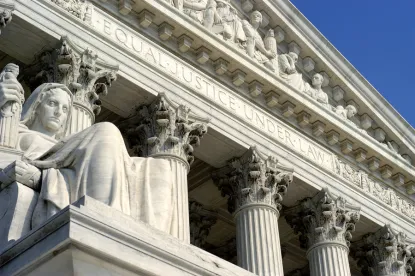In a 6-to-3 decision, the U.S. Supreme Court decided that a plaintiff who rejects a settlement offer or an offer of judgment of complete relief may continue litigating the case. Relying on principles of contract law, the Court ruled that once a settlement offer is rejected by the plaintiff, it has no continuing effect. Because the plaintiff remains empty-handed, he may continue to pursue all available remedies in court, on both an individual basis and on behalf of a class. Campbell-Ewald Co. v. Gomez, 577 U.S. ___ (2016).
Resolving Circuit Court Split on Whether Offer Moots Claim
The dilemma is this: if a defendant offers the plaintiff complete monetary and all other relief that he is entitled to recover on his claims, what is left to be decided or awarded? If there is no case or controversy, a federal court must dismiss the case as moot pursuant to Article III of the Constitution.
The Supreme Court agreed to hear this case because the Circuit Courts of Appeals did not agree on this issue. The First, Second, Fifth, Seventh, and Eleventh Circuit Courts of Appeals had previously ruled that an unaccepted offer does not render a plaintiff’s claim moot. However, the Third, Fourth, and Sixth Circuits had ruled oppositely, holding that an unaccepted offer of complete relief can moot a plaintiff’s claim.
Justice Ginsburg, writing for the majority, pointed to Justice Kagan’s words from her dissent in an earlier case: “When a plaintiff rejects such an offer – however good the terms – [the plaintiff’s] interest in the lawsuit remains just what it was before. And so too does the court’s ability to grant her relief.” Therefore, the Court reasoned, a case is not rendered moot by an unaccepted offer to satisfy the plaintiff’s individual claim.
Chief Justice Roberts Dissents
Chief Justice Roberts dissented, joined by Justices Scalia and Alito. (Justice Thomas concurred with the majority in its holding, but not its reasoning, writing a separate concurrence.) The dissenting justices stated that the “federal courts exist to resolve real disputes, not to rule on a plaintiff’s entitlement to relief already there for the taking.” The dissent would have rendered the case moot on the basis that there is no case or controversy after a defendant agrees to fully redress the injury alleged by a plaintiff.
Can Defendants Still “Pick Off” Named Plaintiffs?
Settling a named plaintiff’s individual claim prior to class certification is appealing to defendants who want to avoid the greater liability and cost of a class action. While this “picking off” strategy may have been undermined, in part, by the Supreme Court’s decision, the Court did not decide whether paymentof complete relief would render the case moot.
This case arose when Jose Gomez sued a marketing firm, Campbell-Ewald, for sending him text messages without his permission. Gomez filed a nationwide class action, alleging violations of the Telephone Consumer Protection Act (“TCPA”), which permits consumers to recover treble damages of $1,500 per call/text message, plus litigation costs. Gomez sought the maximum statutory damages, costs, attorney’s fees, and an injunction against Campbell-Ewald barring further unsolicited messaging.
Before Gomez could file a motion for class certification, Campbell-Ewald offered to settle Gomez’s individual claim and filed an offer of judgment under Rule 68 of the Federal Rules of Civil Procedure. Campbell-Ewald offered to pay Gomez $1,503 per unsolicited message and his court costs, but not attorney’s fees, which Campbell-Ewald argued were not available under the TCPA. Campbell-Ewald also offered to stipulate to an injunction that would bar it from sending text messages in violation of the TCPA. Gomez rejected the settlement offer and allowed the Rule 68 offer of judgment to lapse. Campbell-Ewald then sought dismissal of Gomez’s case, arguing that its offer of complete relief rendered his claim moot. The Supreme Court disagreed.
However, the Court did not decide whether the result would be different if a defendant actually deposits the full amount resolving the plaintiff’s individual claim in an account payable to the plaintiff, with the court then entering judgment in that amount. As Chief Justice Roberts stated in his dissent, the good news is that this case is limited to its facts, and that issue has been left for a future case.



 />i
/>i

